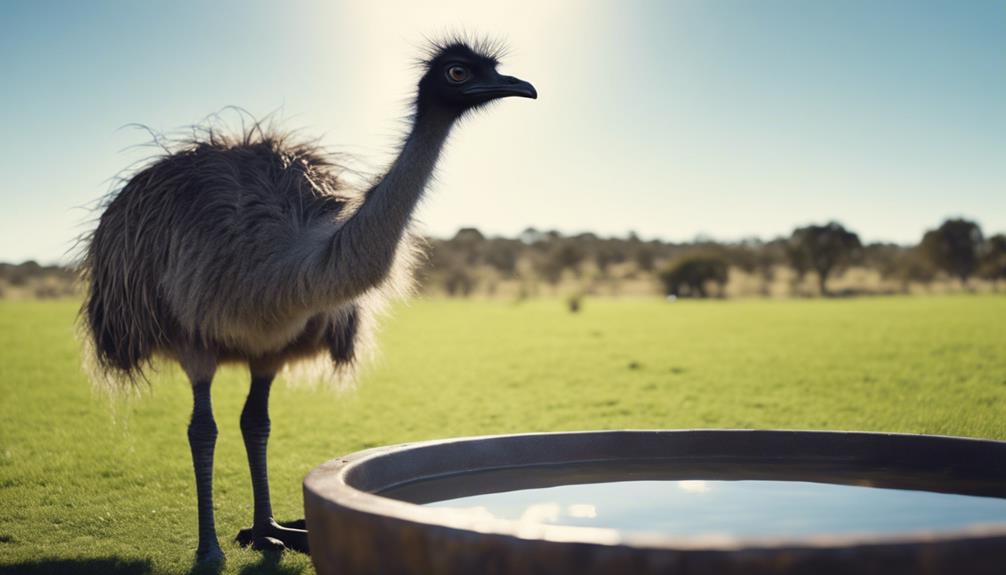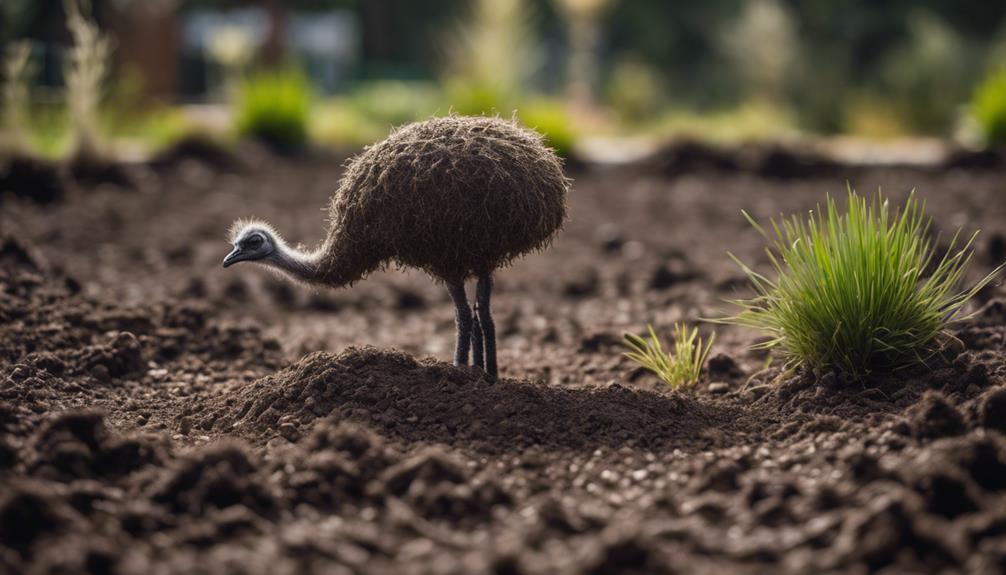
Did you know that emus can reach speeds of up to 30 miles per hour?
Creating the perfect habitat for your emu involves more than just providing a fenced area.
From selecting the right location to ensuring proper shelter, space, and enrichment, there are key elements to consider for the well-being of your emu.
Let's explore how you can enhance your emu's environment to promote its health and happiness.
Key Takeaways
- Provide vast open spaces with natural vegetation for thriving emus.
- Ensure secure shelters with soft bedding and temperature control.
- Maintain balanced diet and regular watering for optimal health.
- Implement security measures and enrichment activities for emu well-being.
Emu Habitat Location

To establish an ideal habitat for emus, select a location that offers ample space and suitable environmental conditions. Emus thrive in habitats with vast open spaces that mimic their natural environment. When considering habitat selection, factors such as land topography, vegetation, and climate play crucial roles in ensuring the well-being of these majestic birds.
Emus prefer areas with natural vegetation like grasslands or shrublands as they provide both food sources and cover. Landscaping the habitat to include a variety of plant species can enrich the environment, offering emus a diverse diet and opportunities for nesting.
Environmental factors such as rainfall patterns and temperature variations should also be taken into account when choosing the right location for an emu habitat. Emus are adaptable creatures, but they do best in areas with moderate temperatures and access to water sources. By carefully considering these habitat requirements, you can create a space where emus can thrive and exhibit their natural behaviors comfortably.
Shelter Requirements
Consider the structural needs of emus when designing their shelter within the habitat. Emus require shelter that provides adequate protection from predators and offers a comfortable environment for nesting and temperature control. When constructing the shelter, ensure it's spacious enough to accommodate the emus comfortably while also incorporating features that promote their well-being.
For nesting materials, provide soft bedding such as straw or hay to create a cozy nest for the emus to lay their eggs. This will help ensure the eggs are kept safe and warm during incubation. Additionally, consider implementing temperature control measures within the shelter, such as proper ventilation and insulation, to regulate the temperature and keep it at optimal levels for the emus.
In terms of shelter design, opt for sturdy materials that can withstand the elements and potential predator threats. The shelter should have a secure door or entrance to prevent predators from entering and harming the emus. By prioritizing predator protection and nesting materials, you can create a shelter that meets the specific needs of your emus within their habitat.
Space Considerations

When planning the habitat for emus, ensure that the space considerations align with the structural needs of their shelter. Emus require ample space to thrive and exhibit their natural behaviors. Here are essential space considerations to keep in mind:
- Roaming Area: Emus are large birds that need plenty of room to move around comfortably. Providing a spacious roaming area allows them to exercise and explore, promoting their physical and mental well-being.
- Nesting Space: Emus are known to nest on the ground, requiring safe and secluded areas for breeding and incubating their eggs. Designing a suitable nesting space ensures their reproductive success.
- Shelter Access: Emus need access to sheltered areas to protect themselves from extreme weather conditions such as excessive heat or cold. Offering them shelter options within their habitat is crucial for their health and safety.
- Separation Zones: Creating distinct zones within the emu habitat for different activities like feeding, nesting, and resting helps in maintaining a harmonious environment for the birds.
- Visual Barriers: Introducing visual barriers such as plants or structures can provide emus with privacy and a sense of security within their living space. These barriers can reduce stress and promote natural behaviors among the birds.
Feeding Guidelines
For optimal health and nutrition, ensure emus receive a balanced diet that meets their specific dietary requirements. Emus are herbivores with high energy needs, so it's crucial to provide a diet rich in nutrients. To meet their nutritional requirements, offer a variety of foods such as grains, fruits, and vegetables. Emus also benefit from dietary supplements like calcium and vitamin D to support their bone health.
Establish a feeding schedule to ensure your emus receive consistent meals. A well-thought-out feeding plan helps maintain their health and prevents overeating. Emus should have access to fresh water at all times to stay hydrated and aid digestion. Monitor their food intake to adjust portion sizes accordingly.
When preparing meals, focus on offering a balanced mix of nutrients to promote overall well-being. Meal variety is key to preventing nutrient deficiencies and keeping your emus content. By following these feeding guidelines, you can support your emus' health and happiness in their habitat.
Watering Needs

To ensure optimal hydration and digestive health for your emus, provide a consistent supply of fresh water in their habitat. Emus have specific watering needs that should be met to maintain their well-being. Here are some essential tips to help you manage the watering requirements of your emus effectively:
- Watering Schedule: Establish a regular watering schedule to ensure your emus have access to water throughout the day.
- Hydration Tips: Monitor your emus' water intake to prevent dehydration, especially during hot weather.
- Pond Installation: Consider installing a pond in the habitat to provide your emus with opportunities for bathing and drinking.
- Sprinkler Systems: Implement sprinkler systems to mimic natural rainfall, keeping the environment moist and allowing emus to cool down.
- Clean Water Supply: Always ensure the water provided is clean and free from contaminants to promote good health in your emus.
Climate Control
Ensuring proper climate control in your emu habitat is crucial for maintaining their health and well-being, as it directly impacts their comfort and overall physiological functions. Emus thrive in temperatures ranging from 50 to 80 degrees Fahrenheit, so temperature regulation is vital. Install energy-efficient heating systems for colder climates and provide shaded areas for hotter regions to help your emus acclimate comfortably.
Humidity control is equally important. Emus prefer a relative humidity level between 20% to 50%. To achieve this, consider using humidifiers or dehumidifiers as needed. Proper ventilation solutions are key to preventing moisture buildup and ensuring fresh air circulation. This can be achieved through strategically placed vents and fans to maintain air quality within the habitat.
Soil and Substrate

Maintaining the proper composition of soil and substrate is essential for creating an ideal habitat for emus. Emus are unique creatures with specific needs, and understanding their requirements is crucial for their well-being. When it comes to soil and substrate in their habitat, here are some key points to consider:
- Soil Composition: Emus thrive in well-drained soil that isn't too compacted, allowing for proper moisture levels and root aeration.
- Temperature: Emus prefer soil that retains heat well, aiding in regulating their body temperature, especially during colder months.
- Digging Behavior: Emus are natural diggers, so providing a substrate that allows for this behavior is important for their physical and mental stimulation.
- Nesting Habits: A suitable substrate for nesting is crucial for emus during the breeding season, ensuring a comfortable environment for egg incubation.
- Maintenance: Regularly inspecting and refreshing the soil and substrate in the habitat is necessary to prevent compaction and ensure a healthy living space for your emus.
Perimeter Fencing
Proper installation of secure perimeter fencing is essential for creating a safe and controlled environment for emus in their habitat. When designing the fencing for your emu enclosure, consider predator prevention as a top priority. Electric fencing can be an effective deterrent for predators and help ensure the safety of your emus.
| Predator Prevention | Electric Fencing |
|---|---|
| Helps deter predators | Provides a shock if touched |
| Ensures emus' safety | Can be solar-powered for sustainability |
| Creates a secure boundary | Requires regular maintenance for optimal function |
In addition to electric fencing, natural barriers such as dense vegetation can act as a secondary line of defense against predators. By combining both physical barriers and technological solutions, you can significantly reduce the risk of predation and create a secure habitat for your emus. Remember to regularly inspect and maintain your fencing to uphold its effectiveness in safeguarding your emus.
Security Measures

To enhance the overall security of your emu habitat, implementing stringent security measures is imperative to safeguard your emus from potential threats. Emus are vulnerable to various predators, making predator prevention a key aspect of ensuring their safety. Here are some security measures to consider:
- Install Motion-Activated Lights: Bright lights can startle predators and deter them from approaching the emu habitat, providing an added layer of security during the night.
- Use Surveillance Cameras: Monitoring the habitat with cameras allows you to keep a close eye on any suspicious activity and take immediate action if needed.
- Employ Guard Dogs: Well-trained guard dogs can help protect your emus by detecting and deterring potential threats from predators.
- Implement Electric Fencing: Electric fencing is an effective way to keep predators out and prevent them from harming your emus.
- Regularly Inspect Perimeter Fencing: Ensuring that all fences are intact and secure is crucial in preventing predators from gaining access to your emus.
Enrichment Activities
Enhance your emus' well-being and cognitive stimulation by incorporating a variety of engaging enrichment activities into their habitat. Behavioral stimulation is crucial for emus as it keeps their minds active and prevents boredom. Provide them with puzzles or toys that encourage problem-solving, such as treat-dispensing devices. Social interaction is equally important; emus are naturally social birds, so consider having multiple emus in the same habitat to promote natural behaviors like grooming and vocalizations.
Exercise opportunities are essential for emus to maintain their physical health. Offer them space to run and stretch their legs, as these large birds need room to move around freely. Environmental enrichment is another key aspect to consider. Mimic their natural habitat by providing different textures to walk on, branches to peck at, and even hiding spots to explore. These elements can help prevent stress and encourage natural behaviors.
Health Monitoring
Monitoring the health of your emus is essential to ensure their well-being and detect any potential issues early on. Regular behavior monitoring and dietary analysis are key components of maintaining your emus' health. Here are some important points to consider:
- Behavior Monitoring: Spend time observing your emus daily. Look for any changes in their behavior such as lethargy, isolation, or decreased appetite. Emus are known to hide signs of illness, so being attentive to their behavior is crucial.
- Dietary Analysis: Keep track of what and how much your emus are eating. A sudden change in their eating habits could indicate an underlying health issue. Ensure they have access to a balanced diet suitable for emus.
- Regular Check-ups: Schedule routine veterinary check-ups to assess the overall health of your emus. Early detection of any health concerns can prevent serious issues from developing.
- Record Keeping: Maintain detailed records of your emus' health history, including any medications, vaccinations, and changes in behavior or diet. This information can be valuable for identifying patterns or trends.
- Consultation: If you notice any concerning symptoms or behaviors, don't hesitate to consult with a qualified avian veterinarian. Seeking professional advice promptly can make a significant difference in your emus' well-being.
Cleaning and Maintenance
Regularly cleaning and maintaining the emu habitat is crucial for ensuring a healthy environment for your emus. Establishing a cleaning schedule is essential to prevent the buildup of feces, uneaten food, and other waste materials that can harbor harmful bacteria and attract pests. Emus are sensitive to unhygienic conditions, so maintaining a clean habitat is paramount for their well-being.
To create an effective cleaning schedule, start by removing feces and uneaten food daily. This simple task helps prevent the accumulation of waste that can lead to bacterial growth. Additionally, regularly inspect the habitat for any signs of pests like flies or rodents. Implementing pest prevention measures, such as sealing any entry points and using safe repellents, can help safeguard your emus from potential health threats.
Frequently Asked Questions
Can Emus Be Housed With Other Types of Birds or Animals?
Emus have unique social behaviors that may not align with other birds or animals. They are territorial and can be aggressive towards unfamiliar species. Cohabitation with emus should be carefully considered to avoid conflicts.
What Type of Vegetation Should Be Avoided in an Emu Habitat?
To ensure Emu safety in their habitat, avoid toxic plants like oleander, azaleas, and yew. Landscaping with Emu diet restrictions in mind is crucial; steer clear of avocado, onions, and garlic, which can harm these magnificent birds.
How Often Should Emu Nesting Areas Be Checked for Eggs?
To ensure successful nesting, monitor emu nesting areas daily during the breeding season. Emus lay eggs every 2-3 days, and the incubation period is around 50 days. Regular checks help safeguard the eggs and ensure proper incubation conditions.
Are There Any Specific Predator Deterrents That Work Best for Emu Habitats?
Just like a vigilant guardian watching over their flock, you can protect your emu habitat with effective predator prevention. Utilize scare tactics like visual deterrents and electronic devices to keep predators at bay.
What Is the Recommended Frequency for Rotating Enrichment Activities in an Emu Habitat?
To optimize behavioral changes and habitat dynamics, rotate enrichment activities in your emu habitat every 1-2 weeks. This frequency ensures environmental impact while keeping your emus engaged and stimulated. Consistent enrichment scheduling is key for their well-being.
Conclusion
In conclusion, creating the perfect habitat for your emu requires careful consideration of their unique needs.
While some may argue that emus can adapt to various environments, providing a suitable habitat will ensure their well-being and happiness.
By following the guidelines outlined in this article, you can create a safe and stimulating environment for your emu to thrive in.
Remember, a well-designed habitat is essential for the health and happiness of your emu.




